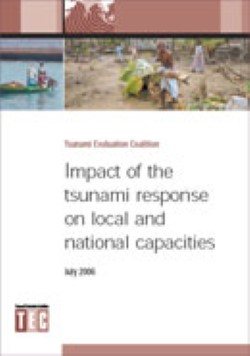Impact of the tsunami response on local and national capacities
Om publikasjonen
- Utgitt: juli 2006
- Serie: Fellesevalueringer
- Type: Evalueringer
- Utført av: --
- Bestilt av: --
- Land: Indonesia, Maldivene, Sri Lanka, Thailand
- Tema:
- Antall sider: 117
- Serienummer: --
- ISBN: 0 85003 812 X
- ISSN: --

This evaluation is one of five thematic joint evaluations undertaken by the Tsunami Evaluation Coalition, supported by Norad.
Four of the tsunami-affected countries were studied - Indonesia, Sri Lanka, the Maldives and Thailand.
This first ever multi-location, multi-country joint evaluation of the impact of an international humanitarian response on local capacities found that most lives are saved and the initial response made by the affected communities and their neighbours. When the international community - UN agencies and INGOs - joined these efforts and facilitated local and national efforts at recovery, the impact was heartening. When the international community bypassed or appropriated local and national response, the impact was almost always cost, effort and time ineffective.
This evaluation also found that recovery is complex - early engagement with local actors in the relief effort is essential for success in recovery and reconstruction. In addition, when the international community engaged with local capacities (actors, institutions and markets), social inequalities and exclusions were better addressed. When local capacities were ignored, social inclusion of the most needy remained an often unsuccessful effort.
Recovery can take place in a context of war, conflict, economic crisis and/or social tension. In all contexts, international assistance is productive when it is better prepared to identify and work with local and national capacities well before the crisis. The tsunami evaluation found that when international agencies are able to resist the pressure to spend quickly and facilitate local efforts for meaningful recovery, achievements of the assistance become sustainable. The evaluation concludes that such preparedness and an enabling international environment makes engaging with local capacities easier and more promising for international agencies.
